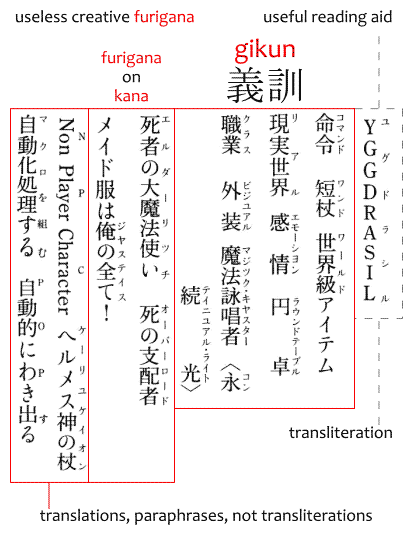Light Novel: Overlord, オーバーロード (Chapter 1, 終わりと始まり)
Description
Examples of gikun 義訓.Translation
- Context: the first chapter of Overlord uses furigana creatively a lot. Overlord is a story about a character who playing a virtual reality MMORPG.
- yugudorashiru
YGGDRASIL
- Here, the furigana is a katakanization of the Latin script. While furigana used like this is unusual, it's a reading aid, not a creative use.
- (komando) meirei
命令
(Command) order.- This and examples below are game terms that are in katakanizations of English words being spelled with kanji that mean basically—and sometimes literally—the same thing in Japanese.
- They're all gikun, since it's the spelling that is used in THIS GAME specifically, and not outside this context.
- In this case, a "command" is an "order" given to an NPC.
- (tanjou) wando
短杖
("Short stick," wand) wand. - (waarudo) sekai-kyuu aitemu
世界級アイテム
(World) world-level item.- This term is read "world item," with sekai-kyuu, "world level," being a high item level.
- (riaru) genjitsu sekai
現実世界
(Real) real world.- riaru, a katakanization of "real," is a Japanese slang referring to real life, as opposed virtual life, on a virtual world, like in an online game, or online forum, etc.
- (emooshon) kanjou
感情
(Emotion) emotion. - (raundo-teeburu) entaku
円卓
(Round table) round table.- As in "knights of the round table," entaku no kishi-dan 円卓の騎士団.
- (kurasu) shokugyou
職業
(Class) job.- In RPGs, the term "class" or "job" refers to a role a character has that defines their abilities, such as the "mage" class having magic abilities, or the "knight" class using a sword, etc.
- (bijuaru) gaisou
外装
(Visual) exterior.- In the sense of how a character looks, with certain appearance settings, cosmetic items equipped, etc.
- (majikku-kyasutaa) mahou eishou-sha
魔法詠唱者
(Magic caster) magic chanter.- A mage class in this game.
- (konthinyuaru-raito)
<永続光>
(Continual light) persisting light.- The name of a magic spell in this game.
- This word is excerpted as-is: in the page it was found, the line wraps after 永 with コン as furigana.
- (erudaa-ricchi) shisha no dai-mahou-tsukai
死者の大魔法使い
(Elder lich) great magic user of the dead.- The name of a class. A lich is an undead sorcerer.
- This example, and the ones below, have a furigana that annotates a whole noun phrase. In particular, shisha no dai-mahou-tsukai contains the no の particle, which is in hiragana, not kanji.
- (oobaaroodo) shi no shihaisha
死の支配者
(Overlord) ruler of death.- shihai suru
支配する
To rule over. To control (a land).
- shihai suru
- meido-fuku wa (jasuthisu) ore no subete!
メイド服は俺の全て!
Maid clothes are (justice) my everything!- A character proclaims his love for maids, and maid uniforms.
- Likely from the sense of "cute is justice," and "you are my everything," except maid is justice, and maids are my everything.
- (enu-pii-shii) non pureyaa kyarakutaa
Non Player Character
In a game, a character a player controls is a player character, while a NPC is any character that no player controls, like shop-keepers, quest-givers, monsters, and so on.- This isn't a reading aid. A reading aid would be non pureyaa kyarakutaa ノンプレイヤーキャラクター, the katakanization of "Non Player Character." This isn't even a transliteration, as NPC is in the same Latin script as Non Player Character.
- The reason why NPC is used here is because while readers may be familiar with NPC abbreviation found in games, they may not be familiar with the extension "Non Player Character" that comes from English, so NPC works as a Japanese translation for Non Player Character.
- (keeryukeion) Herumesu-shin no tsue
ヘルメス神の杖
(Caduceus) staff of Hermes.- In Greek mythology, the caduceus is a staff carried by Hermes, so the base text contains the true meaning of the katakanized gikun.
- Note that both Hermes and caduceus are in katakana, so this furigana usage can't even be mistaken for a transliteration.
- (makuro wo kumu) jidou-ka shori suru
自動化処理する
(To program a macro) to take care of [it] automatically.- In programming, a macro is a single command that instructs a computer to execute a sequence of commands.
- In this example, the base text explains what the gikun means: programming a macro means making a computer (an NPC in this case) execute a sequence of commands without you having to tell it each and every command every time. In particular, this could be a macro executed in response to something else.
- (poppu su~) jidou-teki ni waki-de~ru
自動的にわき出る
(To pop) to spawn automatically.- In gaming, the Japanese slang poppu suru POPする means for an enemy (or other character) to appear (spawn) in an area. The base text is explaining what this slang means.
Relevant Articles
File Usage
The file gikun-overlord-ch01.png has been used in the following articles:
-
振り仮名.
